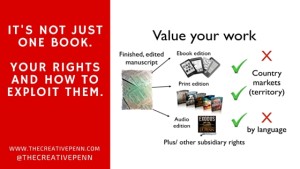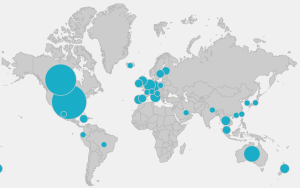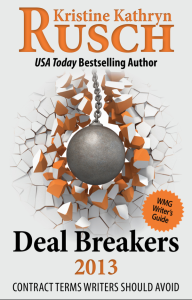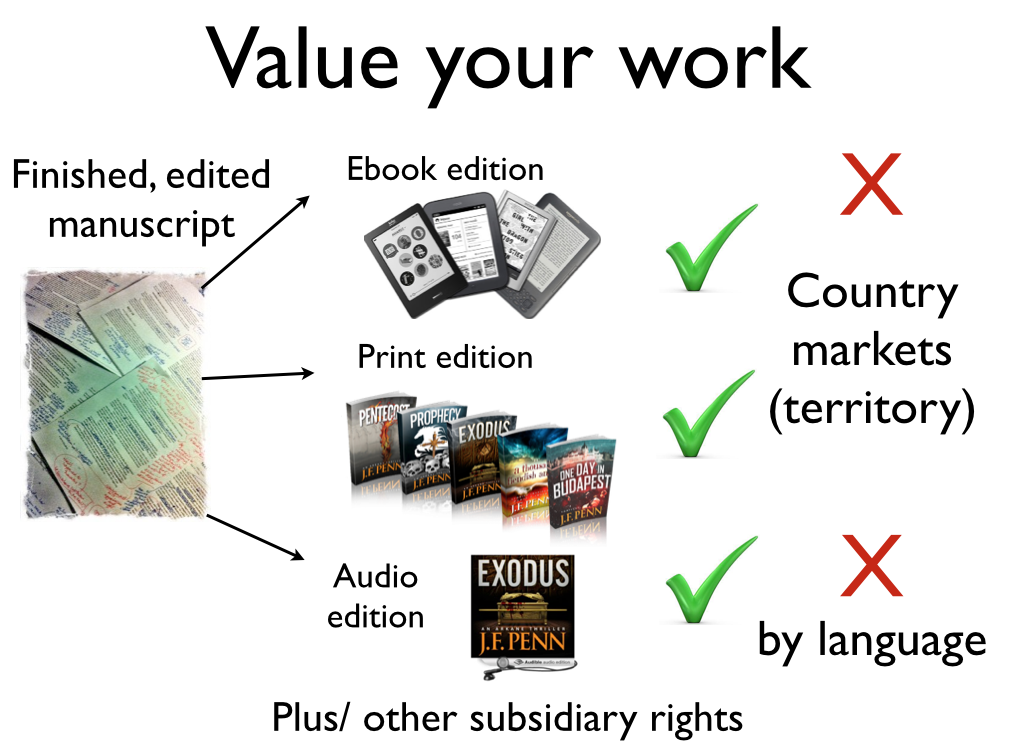OLD POST ALERT! This is an older post and although you might find some useful tips, any technical or publishing information is likely to be out of date. Please click on Start Here on the menu bar above to find links to my most useful articles, videos and podcast. Thanks and happy writing! – Joanna Penn
Warning: this may blow your mind!
It blew mine when the penny finally dropped on what this truly means for my lifetime creative opportunities.

The diagram below outlines the rights model as I see it today. Disclaimer: I am not a lawyer and this is not legal, contractual or financial advice. It is just my opinion and I can’t answer any legal or financial questions.
The word ‘exploit’ in this context is a publishing industry term. It means to exercise your rights or put them into practice. Many publishers buy rights they never exploit, so it is your responsibility to make sure you retain as much as possible and if necessary, exploit them yourself.
I’m passionate about this because a friend of mine just signed a contract for all rights, in all languages, in all territories, for a tiny sum of money. Excited about being published by a big brand publisher, she just didn’t understand the ramifications of signing away those rights.
For an intro to this topic, listen to this interview with Orna Ross about copyright and the basics of rights.
Your manuscript starts as just one document.
Authors therefore generally think in terms of one book equals one product, and they forget that multiple streams of income can flow 
(1) Ebook edition: available for sale on multiple devices: Kindle, Kobo, Apple devices, all cellphones through apps.
(2) Print edition: available for sale on Amazon.com, Barnes & Noble and many other online bookstores.
(3) Audio edition: available for sale through Audible, iTunes, Brilliance and other services.
My ARKANE books are now available in ebook, print book and audiobook versions – that’s three income streams from each manuscript.
As I publish this, I have 8 ebooks available, 7 print books and 3 audiobooks – that's 18 products.
(4) Multiply these editions by country markets, which come under ‘territory’ in publishing contracts
Through Amazon, Kobo, iBookstore as well as the distributors like Smashwords, you can reach multiple territories.

[The map left is from Kobo Writing Life Dashboard that provides handy sales graphics]
Although the volume is quite large in the more mature markets, most of those country sales are small right now. But that’s because the online book sales markets are just only beginning in the global markets.
Fast forward a few years and I think you’ll see how different things will be. The story in 2012/2013 has been about the maturing US/UK/Canadian digital market, but in 2014/2015, the focus will be on the rest of the world. Because I own my rights, I have the potential to sell those 18 products to 27 countries … with more products and more countries coming every month.
Are your books ready to take advantage of this global expansion in digital book sales?
Check out this article on other ways to exploit your foreign rights.
(5) Multiply these editions by language
If you want your books in other languages, you can hire professional freelance translators, in the same way that you can hire editors. But indie authors have also started to do joint venture deals with freelancers, giving them a chance to build a reputation for themselves, 
In 2014, my books will start to be available in other languages based on joint venture deals with professional, freelance translators. Initially, I will have German and Spanish, with more coming online later.
Now think about the countries where these languages are spoken. Spanish is an official or common language in 21 countries, as well as being the second language in the USA and spoken by many people around the world. German is an official language in six countries as well as spoken globally.
These language rights can expand your market in a completely different way.
[If you’re an entrepreneurial translator, I’m interested in joint venture projects for foreign language translations. Please contact me here.]
Other subsidiary rights
There are also opportunities for subsidiary rights. For example, I sold some short stories to Kobo earlier this year, which they used for 
You can also turn your non-fiction book into a multimedia product with video and audio that sells for more money than a book. But I absolutely acknowledge that some rights are hard to exploit without expert knowledge. Film and TV rights for example, are not something that most indies are getting into yet, although again, indie author Hugh Howey managed to attract Ridley Scott with Wool.
When do you want to sell rights?
It’s completely up to you, but the position of professional indie authors these days is more about partnership with publishers on rights deals that are good for both parties. Hugh Howey and others have taken print only deals in English, keeping their ebook and audiobook rights. I’ve also done an audiobook deal with a small press, Gryphonwood, in the US, in order to get my books out there faster.
I would definitely consider any print-only deal, as well as foreign language deals, in order to get into new markets.
For example, I’d love to have my books available in Mandarin and Arabic, which together encompass a huge market worldwide. My books feature Israel heavily, so I’d also love to be published in Hebrew, in Israel. Plus, I have my heart set on India as a key market, as I love the country and need an excuse to go more often! But for me, any contractual discussion must be about partnership.
[If you're a rights agent or publisher, I'd love to talk to you about opportunities! Please contact me here.]
The publishing business is not a charity. Your work is valuable.
Publishing companies are interested in making money, and your manuscript enables them to do that.
So if you want to sign with a publisher, go ahead, but know what you’re doing. If you’re an indie, I hope this excites you about the possibilities, because the road ahead is tremendously exciting!
Remember that.
More resources:
I’m not a lawyer and I’m not giving advice here, just telling you what I see as the opportunities for authors. I can’t answer any legal 
• Deal Breakers: Contract terms that writers should avoid by Kristine Kathryn Rusch. Fantastic investment of just a few dollars for a book that could save you thousands and a lot of heartache. A MUST READ if you want to sign any publishing contract.
• Writer-in-law: M. Scott Boone is an intellectual property lawyer
• Passive Voice Blog – contracts category. Here are a couple of choice posts: Is this the worst paragraph in a publishing agreement? And a bad contract is your fault. David P. Vandagriff is also an intellectual property attorney.
This article has been excerpted from the Author 2.0 Blueprint, a free 87 page ebook all about writing, self-publishing and book marketing. Click here to sign up.
Do you have any questions about rights, or comments about exploiting them yourselves or with partners? Please do leave your thoughts below.



Leave a Reply